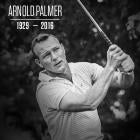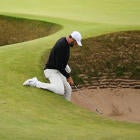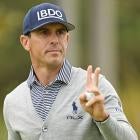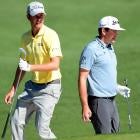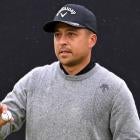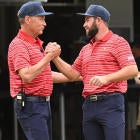Arnold Palmer has died at the age of 87.
He died Sunday at a Pittsburgh hospital, three days after being admitted and one day before he was scheduled to have heart surgery, according to the Pittsburgh Post-Gazette.
Palmer won 62 times on the PGA Tour, capturing four Masters as part of the seven major championships he conquered over his illustrious career. He had been in declining health for a few years and even missed out on the ceremonial first tee shot at Augusta earlier in 2016.
This is certainly Earth-shattering news ahead of the 2016 Ryder Cup.
Palmer is one of the greatest the sport has ever seen and will forever be adored by millions of sports fans.
He accomplished so much it is hard to even know where to begin. The best place to start might be the 1958 Masters where Palmer made birdie at the final hole to secure his first major championship. There was a controversy in that year's tournament after Palmer played two balls on the 12th hole in the final round after his first one embedded.
''I later heard that Ken Venturi was particularly upset, feeling like he had been cheated by my second-ball situation at the 12th,'' Palmer told the New York Times. ''But I felt then and I feel now that I did what any other player could and should do: I followed the rules in both letter and spirit, and as a result, I won my first major.''
The first of seven over the next six years, as it would turn out. Palmer had one of the most compressed major-winning careers ever. All seven of his major championships came between the ages of 28 and 34.
The legend grew in 1960 when Palmer took the Masters and the U.S. Open. That was the year "Arnie's Army," his die-hard base of fans, was born. The most famous tournament Palmer ever played was that year's U.S. Open at Cherry Hills. It turned out to be a classic between him and an amateur who was unknown at the time. The golf world would soon get to know that amateur as well. You know him as Jack Nicklaus.
Palmer trailed by seven strokes going into the final 18 holes. Then he made magic with a 30 on the front and 65 overall to beat Nicklaus by two.
He went out and drove the first green on what was then a downhill 346-yard hole, then two-putted for a birdie. He also birdied the next three holes, then the sixth and the seventh. He bogeyed the eighth but parred the ninth for a 30 going out, then played the back nine in 35 for a 65 that won that Open by two strokes over Nicklaus, a 20-year-old amateur at the time.
History will certainly remember Nicklaus as the better golfer but arguably not the more important one.
Palmer made golf cool and brought it into the mainstream when tournament purses were tiny (Palmer won $14,400 for his efforts at that 1960 U.S. Open). He famously won less than $3 million in his entire career -- or about $8 million less than Rory McIlroy won at the Tour Championship on Sunday.
This goes far beyond golf though. Palmer was Tiger Woods before Tiger Woods was even a thought. In Palmer's day, pro golfers took jobs during the winter and worked on the side to make ends meet. It wasn't the lucrative business it is these days. Not even close.
Palmer was the link between a world of professional golfers and a public that did not know it wanted to consume the sports as vociferously as it does today. Without him, golf as we know it does not exist.
I love this so much. pic.twitter.com/SjtPUCkNhZ
— Jonathan Wall (@jonathanrwall) September 26, 2016
Woods gets so much credit for where golf is at in 2016 (and he should), but Palmer was the one who tossed him the alley-oop from way back in the 1960s and 1970s.
"We should kiss the footsteps of Arnold Palmer because he's the guy responsible for making us more money," former golfer Chi Chi Rodriguez told the Post-Gazette. "When Arnie wins a tournament, I make an extra $100,000."
Palmer was also the first to think of himself as a brand. Because of this, Palmer was making $40 million a year well into his 80s. He invented a drink -- you know it as an Arnold Palmer, of course (half iced tea, half lemonade) -- flew his own plane from tournament to tournament, started a network, traveled the world and took a sport from national afterthought to an obsession for many folks. It was quite a life Palmer lived. Golf was almost not even the centerpiece.
Athletes awarded Congressional Gold Medal:#ArnoldPalmer
— Justin Ray (@JustinRayGC) September 26, 2016
Jackie Robinson
Jesse Owens
Joe Louis
Roberto Clemente
Byron Nelson
Jack Nicklaus
And this is why he has touched so many. It's why he connected with fans in a way Nicklaus (and to a large extent Woods) never can. Golf was it for them. For Palmer, it was a gateway. He was great at the sport, no doubt, and his swashbuckling, creative swing and style were seemingly hand-picked for the boom of the television era. But it always seemed to extend beyond the golf for The King.
For all that Palmer accomplished in his career, when he looked back on his career it was always the people -- Arnie's Army -- that meant the most.
"I feel the strength of the gallery, especially on a critical shot," he told the New York Times. "Silence is louder than any noise on a golf course -- the deathly silence that I sometimes feel and hear when I'm out there. That will tell you how powerful the galleries really are. They have an appreciation of what you're going through, of what's happening, and they understand."
This was the essence of Palmer. It grounded itself last year at the 2015 Open Championship at St. Andrews. Palmer, struggling in health at the time, almost certainly knew that would be his last voyage to the home of golf. It resulted in one of the most moving interviews I have ever seen.
Palmer spoke of how much the sport meant. How much the people mean. It is staggering to watch. I almost cannot watch it without choking up. I don't know how anyone could.
"It was wonderful. All these people who fill the stands up," said Palmer. "The enthusiasm that I saw .... today. It made all of it ... it was wonderful. The game of golf ... what has happened and what will continue to happen in the game. This reminds me, and I hope will remind a lot of people of how great it is."
Long live The King.








